My application manages bookings of a user. These bookings are composed by a start_date and end_date, and their current partition in dynamodb is the following:
PK SK DATA
USER#1#BOOKINGS BOOKING#1 {s: '20190601', e: '20190801'}
[GOAL] I would query all reservations which overlap a search time interval as the following:
I tried to find a solution for this issue but I found only a way to query all items inside a search time interval, which solves only this problem:
I decided to make an implementation of it to try to make some change to solve my problem but I didn't found a solution, following you can find my implementation of "query inside interval" (this is not a dynamodb implementation, but I will replace isBetween function with BETWEEN operand):
import { zip } from 'lodash';
const bookings = [
{ s: '20190601', e: '20190801', i: '' },
{ s: '20180702', e: '20190102', i: '' }
];
const search_start = '20190602'.split('');
const search_end = '20190630'.split('');
// s:20190601 e:20190801 -> i:2200119900680011
for (const b of bookings) {
b['i'] = zip(b.s.split(''), b.e.split(''))
.reduce((p, c) => p + c.join(''), '');
}
// (start_search: 20190502, end_search: 20190905) => 22001199005
const start_clause: string[] = [];
for (let i = 0; i < search_start.length; i += 1) {
if (search_start[i] === search_end[i]) {
start_clause.push(search_start[i] + search_end[i]);
} else {
start_clause.push(search_start[i]);
break;
}
}
const s_index = start_clause.join('');
// (end_search: 20190905, start_search: 20190502) => 22001199009
const end_clause: string[] = [];
for (let i = 0; i < search_end.length; i += 1) {
if (search_end[i] === search_start[i]) {
end_clause.push(search_end[i] + search_start[i]);
} else {
end_clause.push(search_end[i]);
break;
}
}
const e_index = (parseInt(end_clause.join('')) + 1).toString();
const isBetween = (s: string, e: string, v: string) => {
const sorted = [s,e,v].sort();
console.info(`sorted: ${sorted}`)
return sorted[1] === v;
}
const filtered_bookings = bookings
.filter(b => isBetween(s_index, e_index, b.i));
console.info(`filtered_bookings: ${JSON.stringify(filtered_bookings)}`)
